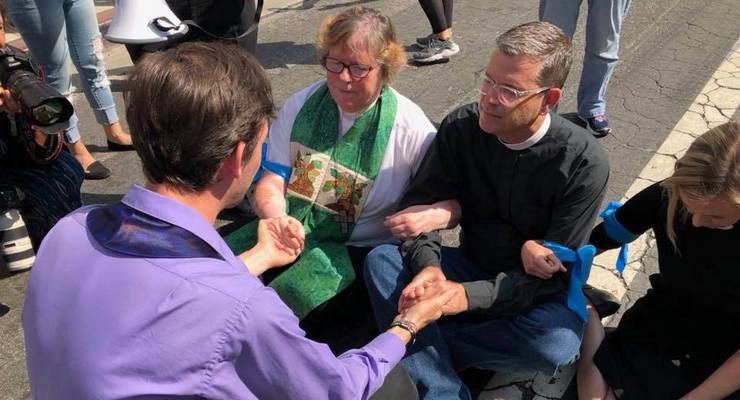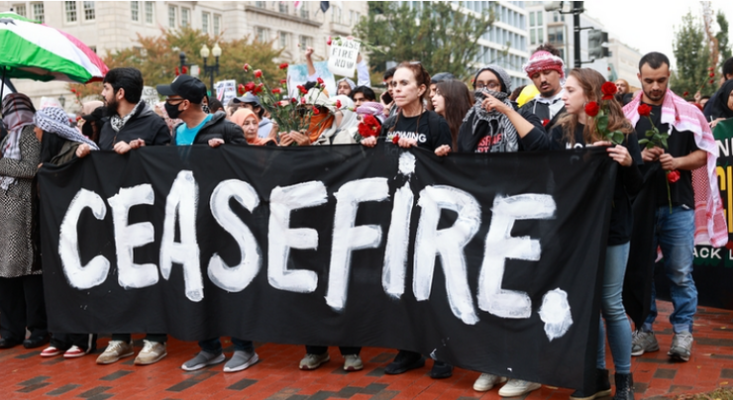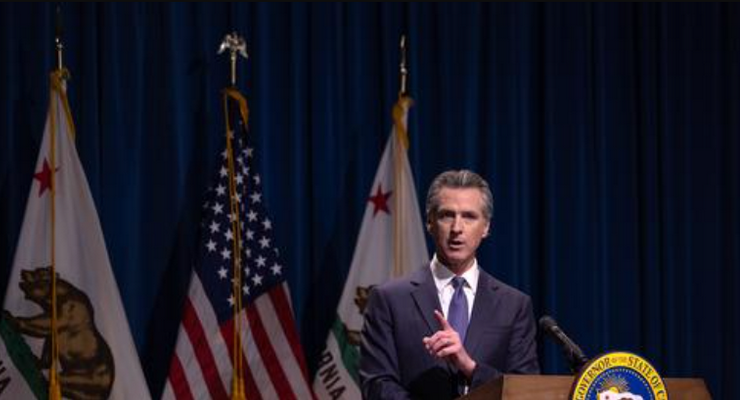
On Tuesday of this week, among hundreds of demonstrators protesting the Trump administration’s controversial immigration policies outside a downtown Los Angeles courthouse during a visit by United States Attorney General Jeff Sessions, about two dozen members of the clergy were arrested after ignoring a police order to disperse.
The first protestor arrested was Rev. Sandy Olewine of Pasadena’s First United Methodist Church.
The event drew about 200 people who chanted slogans of solidarity and shouted, “Shame on Sessions.” The action was not necessarily unique in today’s tense political climate — it happens almost every day in some city, somewhere — but what made this protest different was the local clergy members sitting across Spring Street, arms linked, chanting “Kids belong at home, not in cages.”
Within minutes of the protest forming, police declared an unlawful assembly and, one by one removed the clergy from the area. The first in line was Rev. Olewine. She spoke to Pasadena Now about the experience, and what she hopes to achieve within the church and as a front line protester in response to what she feels are harmful immigration policies by the Trump administration.
Did all the clergy in Tuesday’s protest make a plan to stand together prior to Sessions’ arrival? Can you walk us through the experience?
Well, we knew that Attorney General Sessions was going to be in town. We knew he was having a meeting in the federal building and we felt it was important to draw attention that the zero-tolerance policy that this current administration is carrying out. It violates every ethical and moral standing within our faith traditions and undergirds the best of who we are supposed to be as a nation. We have to, as spiritual leaders, draw attention to this. It has to be fixed, and it has to be stopped. So we stopped traffic as a way to communicate that. We had already agreed, of course, that we follow the ethics of nonviolent protest which means we don’t demonize and/or respond to arrest. We knew we would be arrested if we did not leave the street. When the captain came to me—I was on the end—they (the police) reiterated that they didn’t want to arrest us because they supported our right to be there. Some of them, I suspect, supported our reason for being there as well. The captain said he we would appreciate if we left and I explained to him that we could not do that. We needed to communicate that this was a behavior and a situation going on that required us to stay seated. So, he said, “Well, we will have to arrest you.” I said, “Yes, we know that and we appreciate that you need to do your job but we’re doing our job, and it’s all OK.” They then sent the officers over. They were very helpful (in the process.)
So, it was it was clergy from all walks, all denominations?
Right. There were nine United Methodists, and that was important for us because Jeff Sessions is a United Methodist. The first rule of our denomination is “do no harm,” and this is doing harm. There were Episcopal priests, there were UCC priests, there were rabbis that were there as well and a few other non-denominational faith leaders. There were twenty-three of us in total.
There are a lot of evangelical Christians that actually are in support of what the administration is doing. How do you how do you, as a clergy member, view that?
This policy actually pushed some evangelical clergy to finally say this was even too much for them. There have been those that have been very supportive of this administration and its policies, and this has even pushed them over the edge a little bit. They wouldn’t go as far as going into the streets such as we did, but at least, for them, this policy was less clear.
There’s a split in the evangelical church which is quite prophetic and socially conscious. Evangelicals have been Sojourners, and that community is very much in line with where we are, but you have a section of the community that has given up the gospel of Jesus Christ for a gospel of an American religion that really has very little to do with the actual gospel. It’s a civil religion, and to me it’s idolatrous. For them, it’s a religion where you use God to be the God of your tribe, and use Jesus as your shield to do whatever you want in the name of your people and forget that that’s kind of not what Jesus was about. I think it is time for Protestant, Catholic and Orthodox Christians who understand the gospel to speak up and speak out because we are in a dangerous time.
Are your parishioners very supportive of what you’re doing?
If there are those that are not, they have not said anything. The hate email I’ve been getting is pretty intense, but it’s not from my congregation. We’ve had great support—all three of our full-time clergy were there. I was first, my minister of music was second, and my minister of youth and families was third. All three of us were arrested together. In general, so far, the congregation has been very supportive of what we did and supportive and understanding why we took that action.
Can you tell me about the complaints against Sessions by the United Methodist Church?
I was one of the signers on that. We have a process in our own denomination in that we file what are called complaints. They are generally used against clergy members. It’s very seldom that we that someone as a layperson has a complaint filed against them, but we felt that the extreme nature of the zero-tolerance policy that Jeff Sessions has been supporting as attorney general was an utter contradiction with what we teach as a denomination.
What is the goal of the complaint?
It’s not meant to excommunicate. The call for that complaint is to have a purge or conversation and to encourage Sessions’ pastor, the district superintendent, and even the bishop to talk with him about what our church teaches about these things and the way in which these national actions are violating this. It’s an invitation into a process of reconciliation. That’s the first hope. None of us who signed it would hope it would lead to the stripping of his membership in the church. The hope is that in conversation and dialogue that there may be a breakthrough in him and that he might reclaim parts of what we what we teach about what it means to follow Jesus. That’s the first hope. Normally, those things are within a local congregation or a local area. To have hundreds of clergy and laity from across the country involved was an extreme measure to take. But because of the extreme power that Mr. Sessions wields in our nation today, we felt like we needed to do something.
Does he have a certain time to respond to that?
There’s a process. The pastor of the church that he goes to in Virginia when he’s in town actually responded, but the jurisdiction is actually with his home congregation. So, the pastor and the district superintendent will invite him in for conversation. He may or may not (respond.) We have what’s called a just resolution, so that something will be talked about and what steps are going to be taken. Then, the hierarchy of the church can decide whether or not they move it further up in our system for review.
In some ways, going public with it (the complaint) was an act of trying to draw some attention to it. Our sense would be that he probably will not respond to it. Our hope is something will break through, however. We will continue to pray for him, that his heart might be broken open. That’s the intent—it isn’t to shame and or excommunicate but to try to call for reconciliation, which means both healing and turning away and repenting from those things that violate the very essence of what we teach.
I was going to ask if you were going to protest again, but it sounds like you already will.
We live in a time where I think we’re going to have to do that. If it feels like a moral or ethical emergency that we are in, and if something else happens that requires me to do so, as someone who tries to follow Jesus, I can’t sit by and not respond.
The first response is to call elected officials and write letters. But when those do not work then yes, if need be, I will be on the street.
It’s so easy to get overcome by it all. People get discouraged and don’t want to pay attention. I wrote on my Facebook page that one of the reasons I did this is I have a three-year-old grand niece, but I’m her Nana, I’m her grandmother. When she gets old enough to know what’s going on, and she asks me, “Nana where were you?” I want her to know that I was preaching and I was teaching and I was writing and I was getting arrested to say “stop.” I want her to know her Nana was not a bystander and she has some model of what it means to live in a community and to love your neighbor. It’s also for her all that I do this. It’s both for the children that are now in detention but also for the children in my life, that they have some model of what it means to be faithful.
















